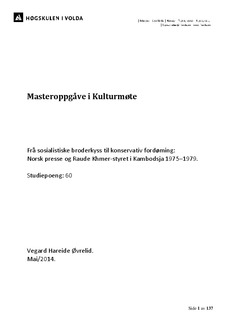| dc.description.abstract | Summary
From Socialist fraternal kisses to Conservative condemnation: The Norwegian press and the Khmer Rouge rule in Cambodia 1975-1979. The Khmer Rouge came to power in Cambodia in 1975. During their four years in power, the rule of Pol Pot and his fellow communist cadres was responsible for the death of approximately 1.5 million Cambodians. They were driven from power by a Vietnamese invasion in early 1979. This thesis aims to highlight the attitude of the Norwegian written press towards the regime at the time. As was the case with a lot of other Western European countries, Norwegian society in the mid seventies contained a very vocal and industrious Marxist-Leninist minority. What set Norway apart, was its strong connection between newspapers and political parties, a concept known as the “Party Press”. The three newspapers I focus on, all had this in common. The one furthest to the ideological left, Klassekampen, had very strong ties to the Marxist-Leninist party (AKP(m-l)). It had been very vocal in the protests against the United States’ involvement in Vietnam, and supported the Khmer Rouge in the Cambodian revolution against the U.S. supported government. It would stay supportive towards Pol Pots party all the way up to the Vietnamese invasion and beyond. A bit further to the right, but still decidedly socialist, was Ny Tid. After the Khmer Rouge revolution, this paper (who was strongly connected to the socialist Sosialistisk Venstreparti party) was also very supportive of the new rulers. To the right on the political scale was Aftenposten, a paper tightly connected to the conservative party, Høyre. It sided with South Vietnam, and stayed true to this allegiance even after the Norwegian government (and most other newspapers and political parties) changed views. The thesis shows how the views of these three Norwegian newspapers manifested themselves after the 1975 revolution, but also how they changed when Vietnam invaded Cambodia some years later. In the intervening years, alliances in Indochina had changed, due to the effects of the Sino-Soviet split, which fractured the unity of the communist world. Klassekampen had a strong affiliation towards Mao’s China, whereas Ny Tid did not seem to take sides. As Vietnam grew closer to the Soviet Union and the Khmer Rouge regime had strong ties to China, Klassekampen took Khmer Rouge’s side during the Vietnamese invasion, deeming it a hostile revisionist-imperialist takeover. Ny Tid stuck to its sympathies towards Vietnam, meaning the two major Norwegian communist parties, who had both strongly been supporting North Vietnam in the war, were suddenly on opposite sides. Aftenposten, meanwhile, now found itself taking the same stance as ideological opposites Klassekampen on the issue of who were the legitimate leaders of Cambodia. As one communist country invaded another, Aftenposten was not concerned with the Sino-Soviet split. Instead, it focused on international law, taking the side of a sovereign country (Cambodia) being invaded by a foreign power (Vietnam), even suggesting the Khmer Rouge should rightfully take Cambodia’s place in the United Nations assembly. Thus, as the thesis shows, the Sino-Soviet split, happening half a world away, caused the Cambodia-Vietnam conflict to create strife between Norway’s biggest communist parties. In addition, it made unlikely (although very temporary) allies out of two of the most ideologically opposed newspapers in Norwegian society. | en |
